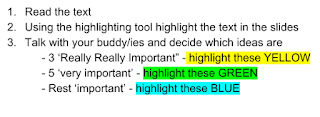So 11 weeks down, how's it all going for me? Well, not so flash but one could argue that I haven't really set myself up for success on this occasion. The old saying 'doing what you've always done and expecting a different outcome' is definitely alive and well here!
After speaking with a specialist about a minor health issue, her advice (one of many) was to lower my stress levels and strive for a better work/life balance. "But how?", my 'poor example for a work/life balance' mother asked when I spoke about it with her. How do you get a balance for a job that is never done? How do you maintain a professional standard, while not answering emails at 9.30 at night? How do you manage your extra work responsibilities while leaving work before 5pm every day? Of course every time I work in the evenings or on weekends it is my choosing and my want to provide the best for the students I teach. I also don't always see this as an issue and the perfectionist in me is alive and well but it has got me thinking again about my idea from the beginning of the year and the way I 'sell' the 'learn, create, share' learning philosophy with others. No ones going to want to try using a multimodel approach to teaching reading if they think it will take them longer to plan than their current programme!
I started watching a series very long winded video about an American couple (created for learning) who discuss this very idea of work/life balance. In a nutshell these are the ideas that I found the most useful, not necessarily rocket science but food for thought.
- Make the decision to arrive and leave on time every day (with a few exceptions of course). What time will work best for me, my colleagues and provide the time to complete what I need to get done?
- Where are the pressures/expectations coming from? Or more importantly what unspoken pressures have I instilled upon myself? For example, the idea that I should work in the evenings or I have to get everything looking good on our class site.
- Make to-do list and actually use them. I envision that for this to be most effective, I would need a longer term to-do list and then to-do list broken down into aims for before and after school. I also like the idea of completing a to-do list for the following morning before you leave for the day.
- Watch out for 'water cooler' talk. As much as I love to catch up with my colleagues I know that an hour can very easily slip by and I will have been unproductive. I get caught in the whole 'came to the staff room to get a drink and ending up sitting and gossiping!
- What can I trade. I'm a bit of a perfectionist and I like things to look good, but I know that this is effects my time management. Sometimes I like to ask myself "will this have an effect on the children's learning?" Chances are that the pretty background on my slideshow will not have any effect and therefore doesn't really need to be done when time is short!
- Use any spare moment effectively. Refer to to-do list and make the most of the opportunity.
- Do similar tasks at the same time eg set aside time to respond to emails
- Work at work. Sounds simple but it is drawing a line in the sand and saying when enough is enough.
As I said not necessarily rocket science but it has got me thinking about some things I need to make better attempts at in order to get a better work/life balance.








